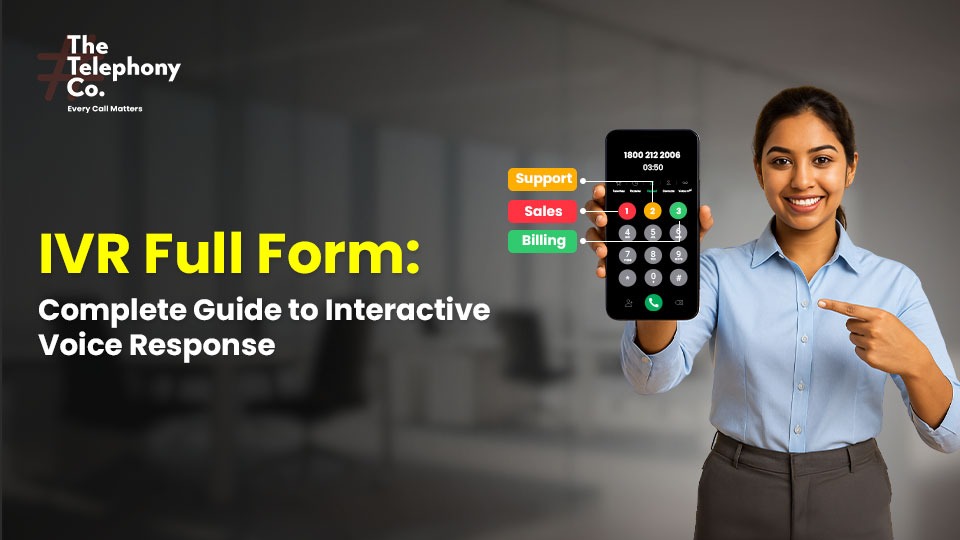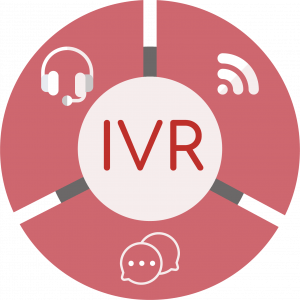Customers expect quick and seamless communication with businesses. No one likes being put on hold for long minutes or transferred from one department to another without answers. This is where IVR (Interactive Voice Response) systems come in.
An IVR system is more than just a pre-recorded greeting. It’s a smart automated call management solution that helps businesses handle calls efficiently, provide 24/7 customer support, and improve overall customer satisfaction. Whether you run a small business, a call center, or a global enterprise, IVR can transform the way you interact with your customers.
Here, we’ll dive into everything about IVR — from what it is and how it works, to its key features, types, benefits, real-world use cases, and the future of IVR in modern business communication.
What is IVR (Interactive Voice Response)?
IVR full form, Interactive Voice Response, is an automated phone system that allows callers to interact with your business using keypad inputs or voice commands.
With IVR, callers can use pre-recorded voice menus to choose the right department on their own. The system can automatically answer simple queries such as business hours, account balance, or order status. For more complex questions, the IVR intelligently transfers the call to the most suitable live agent, ensuring faster and more efficient customer support.
Modern IVR systems are often cloud-based and can integrate with CRM tools, AI, and analytics to deliver a faster, more personalized, and professional customer experience. Businesses of all sizes use IVR to save time, reduce costs, and ensure 24/7 customer support.
Start Your IVR Solution Today and Reduce Call Handling Time
Deliver Faster Service
Save Time & Costs
Build Stronger Customer Loyalty
How IVR Works
The process behind an IVR system (Interactive Voice Response) may seem technical, but it’s actually straightforward. Here’s a step-by-step explanation of how it works:
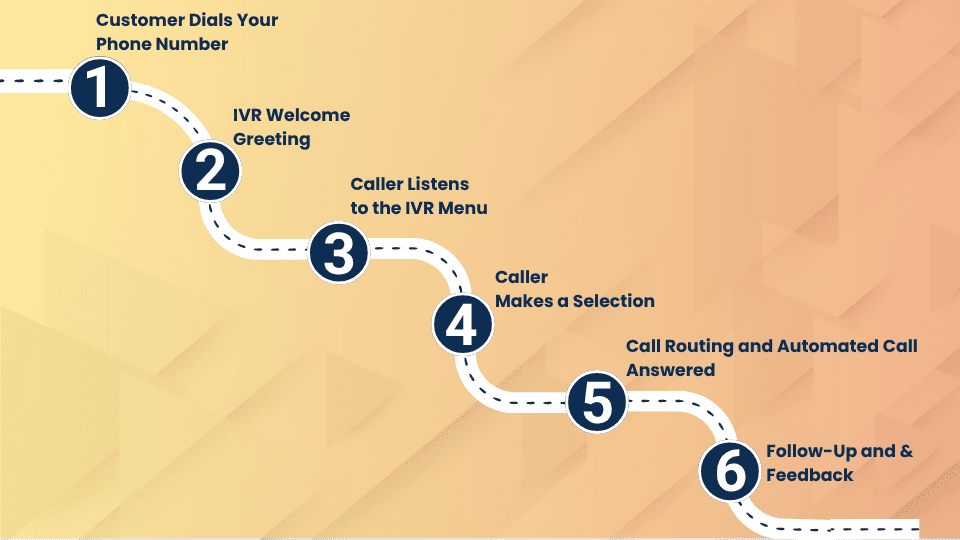
Customer Dials Your Business Phone Number
The journey begins when a customer calls your company’s IVR phone number. This could be a toll-free number, local number, or virtual number.
IVR Welcome Greeting
The IVR system greets the caller with a customized message, such as:
“Hello! Welcome to The Telephony Co. Your call is important to us.”
Caller Listens to the IVR Menu
The system then presents a menu of options. For example, the IVR System first asks the caller to select a language:
- Press 1 for Hindi
- Press 2 for English
Once the language is selected, the IVR provides further options, such as:
- Press 1 for Sales
- Press 2 for Support
- Press 3 for Billing
This IVR menu allows callers to self-navigate and choose the department or service they need.
Caller Makes a Selection
Using keypad inputs or voice commands, the customer selects the option that best matches their requirement. The system ensures the caller reaches the correct service path without confusion.
Call Routing and Automated Call Answered
Based on the caller’s selection, the IVR System performs one of two actions:
Call Routing: The IVR telephone system routes the call to the right agent or department based on the input provided by the caller.
Automated Call Answers: For simple queries, the IVR calling system can provide instant automated responses without connecting to a live agent. This includes information such as order status, account balance, or business hours.
Follow-Up and Feedback
After resolving the caller’s query or issues, the IVR phone system can offer a feedback and rating option to measure satisfaction:
- Please rate your experience from 1 to 5, with 5 being excellent.
- Press 1 if you are satisfied with the service, press 2 if you need further assistance.
Types of IVR Systems
IVR systems are designed to automate customer interactions and streamline call management. Depending on the business requirements, IVR phone systems can be classified into different types. Here are the lists
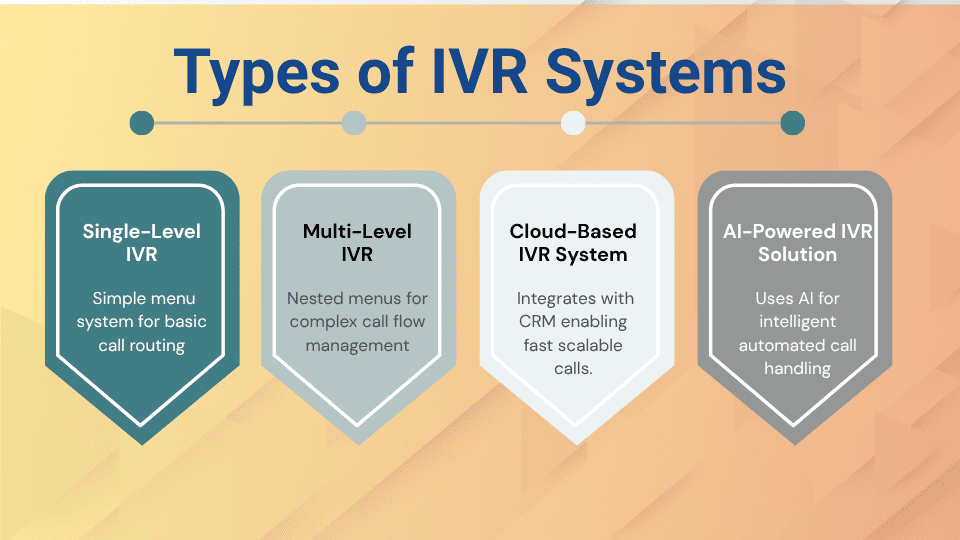
Single-Level IVR
Single-level IVR is the simplest type of IVR system, offering callers a single menu of options. It is ideal for small businesses with limited call routing needs.
Multi-Level IVR
Multi-level IVR allows for nested menus and multiple levels of options. It is suitable for medium to large businesses that require more detailed call routing.
Example:
- Level 1: “Press 1 for Hindi and Press 2 for English.”
- Level 2: “Press 1 for Technical, Press 2 for Billing, Press 3 for Sales
Cloud-Based IVR System
A flexible IVR solution that requires no heavy infrastructure, seamlessly integrates with CRM and analytics tools, and enables fast, scalable, and automated customer call management.
AI-Powered IVR Solution
An intelligent IVR system that uses AI and voice recognition to automate call handling, provide personalized responses, and enhance customer experience.
Top Advantages of Using IVR Systems for Modern Businesses
Implementing an IVR system provides numerous advantages:
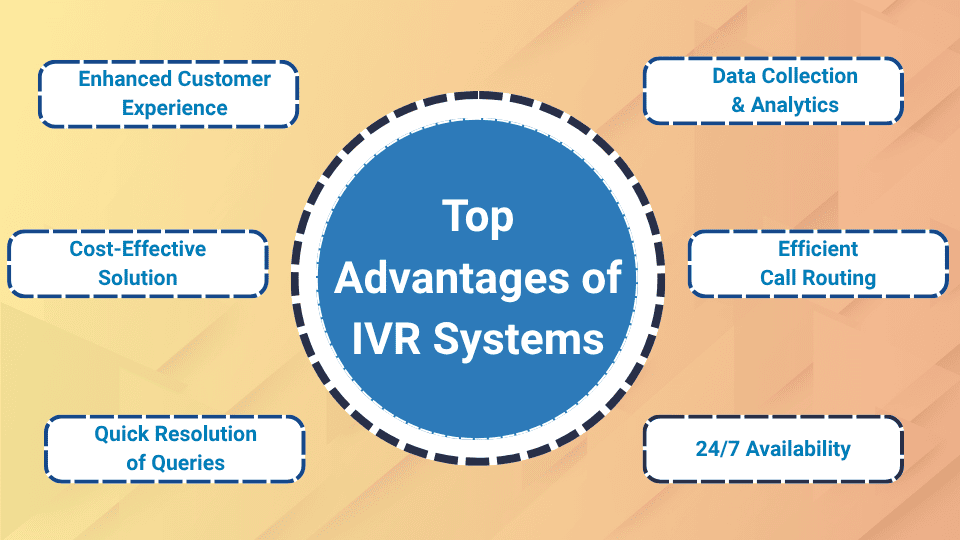
Enhanced Customer Experience
Customers no longer need to wait for an agent. With IVR, they can simply press a number and be quickly connected to the right agent or department.
24/7 Availability
IVR is a computerized self-service system that allows customers to get answers without depending on a live agent. Because it runs automatically, IVR provides round-the-clock availability.
Cost-Effective Solution
With traditional customer support, the per-agent cost can be very high. An IVR self-service system significantly reduces these expenses by automating call routine inquiries, providing instant answers, and handling high call volumes.
Quick Resolution of Queries
With IVR, simple questions and common issues are resolved automatically, freeing agents to concentrate on complex problems and improving overall response times.
Data Collection & Analytics
The Telephony Co’s advanced IVR systems capture call data, menu selections, and customer feedback. Businesses can analyse this information to optimize call flows, track agent performance, and improve decision-making.
Efficient Call Routing
IVR intelligently directs calls to the right agent or department based on customer input. This reduces misrouted calls, waiting time, and customer frustration, improving overall service efficiency.
Multi-Language Support
With IVR solution, customers can choose their preferred language, making communication easier and improving satisfaction for a global audience.
Real-World IVR Use Cases Across Industries
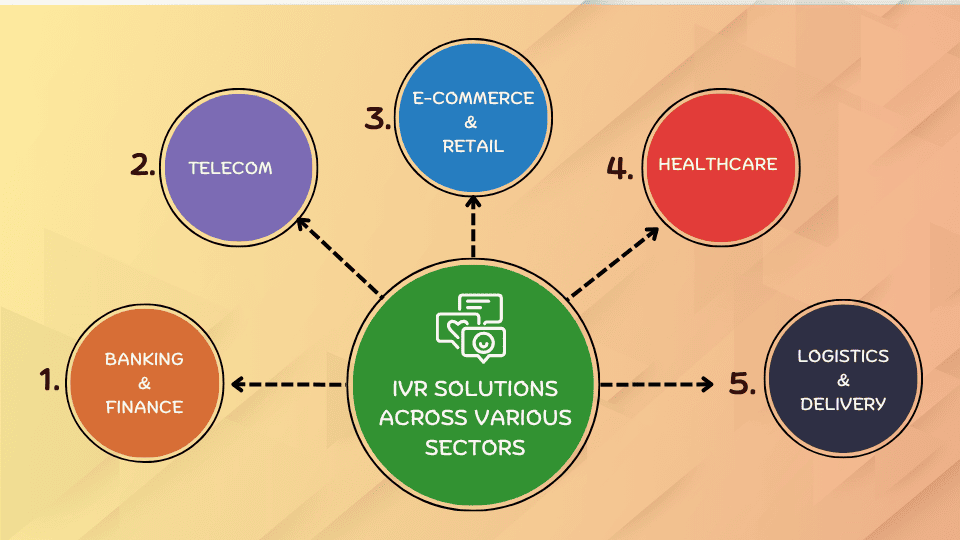
Banking & Finance
IVR lets customers check balances, view transactions, manage cards, and order chequebooks without needing a live agent.
Telecom
Customers can use IVR self-service options for balance checks, bill payments, recharge, plan information, and service activation.
E-Commerce & Retail
Use IVR (Interactive Voice Response) Track orders, returns, offers, delivery status, and more for a better customer experience.
Healthcare
No more waiting for live human agent—use IVR to book appointments, receive reminders, and check test results.
Logistics & Delivery
Track shipments and delivery status, schedule pickups, and manage rescheduling efficiently.
Final Thoughts
IVR calling solutions play an important role in modern business communication. By allowing customers to resolve queries and issues themselves, IVR (Interactive Voice Response) reduces wait times, increases efficiency, and enhances the overall customer experience.
Modern IVR systems integrate seamlessly with business tools, CRM platforms, and other communication systems, ensuring smooth workflows. Features like call routing, call forwarding, self-service menus, and automated responses make IVR an essential solution for businesses aiming to streamline support, improve agent productivity, and deliver faster resolutions.
FAQs (Frequently Asked Questions)
What is the full form of IVR?
The full form of IVR is Interactive Voice Response. It is a technology that allows callers to interact with a business phone system using keypad inputs or voice commands, enabling automated call routing, self-service options.
Can IVR integrate with CRM?
The Telephony’s modern cloud-based IVR system integrates seamlessly with CRMs and business tools, enabling businesses to manage customer data, track calls, and enhance overall service efficiency
What is the difference between IVR and chatbot?
IVR handles voice and phone calls, while chatbots manage text-based communication like chat and messaging apps.
What is the difference between IVR and auto-attendant?
Auto-attendant simply directs calls, while IVR can handle complex interactions and self-service.

